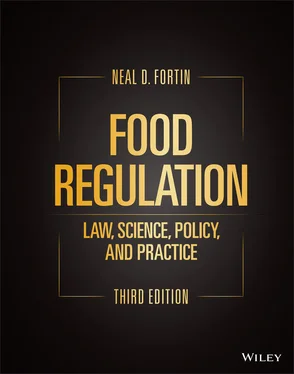Neal D. Fortin - Food Regulation
Здесь есть возможность читать онлайн «Neal D. Fortin - Food Regulation» — ознакомительный отрывок электронной книги совершенно бесплатно, а после прочтения отрывка купить полную версию. В некоторых случаях можно слушать аудио, скачать через торрент в формате fb2 и присутствует краткое содержание. Жанр: unrecognised, на английском языке. Описание произведения, (предисловие) а так же отзывы посетителей доступны на портале библиотеки ЛибКат.
- Название:Food Regulation
- Автор:
- Жанр:
- Год:неизвестен
- ISBN:нет данных
- Рейтинг книги:4 / 5. Голосов: 1
-
Избранное:Добавить в избранное
- Отзывы:
-
Ваша оценка:
- 80
- 1
- 2
- 3
- 4
- 5
Food Regulation: краткое содержание, описание и аннотация
Предлагаем к чтению аннотацию, описание, краткое содержание или предисловие (зависит от того, что написал сам автор книги «Food Regulation»). Если вы не нашли необходимую информацию о книге — напишите в комментариях, мы постараемся отыскать её.
Food Regulation: Law, Science, Policy, and Practice
Food Regulation: Law, Science, Policy, and Practice, Third Edition,
Food Regulation — читать онлайн ознакомительный отрывок
Ниже представлен текст книги, разбитый по страницам. Система сохранения места последней прочитанной страницы, позволяет с удобством читать онлайн бесплатно книгу «Food Regulation», без необходимости каждый раз заново искать на чём Вы остановились. Поставьте закладку, и сможете в любой момент перейти на страницу, на которой закончили чтение.
Интервал:
Закладка:
Thus, an administrative agency can serve as the lawmaker, the prosecutor, and the judge, all rolled into one. This does not necessarily violate the principle of separation of powers. The rationale is that administrative agencies have narrow areas of technical expertise, they are controlled by numerous procedural requirements, and these decisions always may be appealed to the court system. Due process and the APA specify that agencies, when engaged in adjudication, must provide a person notice of the case against him or her, and a meaningful opportunity to present their case. In some cases, the determination must be made by trial‐type proceeding. 35
While court challenges of agency adjudications are not uncommon, it should be noted that those challenges are usually based on procedural, rather than substantive grounds. The courts are enormously deferential to an agency’s expertise, and are unlikely to interfere with the substantive decisions made by an agency. 36 Procedural challenges are much more likely to be successful, and also provide greater advantage for negotiated settlements or delays in the implementation of the agency’s decision. For example, a grocery store may challenge an agency’s decision to revoke their license due to insanitary conditions. However, the challenge is far less likely to be successful on the basis that the agency was incorrect in its professional judgment that the store was insanitary (a substantive challenge), as opposed to the challenge that the agency failed to consider all pertinent evidence in the record because it failed to properly notify the establishment (procedural challenges). A court is far less likely to overturn the agency’s decision on the seriousness of the insanitation than to find there was a procedural deficiency.
1.4.4 Judicial Review
Administrative agency activity must also be consistent with the Constitution and relevant statutes. Judicial review of administrative agency activity oversees this consistency. Standards for judicial review of agency actions are outlined in the APA, which defines the basis and scope of judicial intervention and review. Generally, the courts will not consider whether an agency acted wisely, but only whether the agency acted as follows:
Stayed within its constitutional and statutory authority.
Properly interpreted the applicable law.
Conducted a fair proceeding.
Avoided arbitrary or capricious action.
Reached a decision supported by substantial evidence in the record.
However, the Supreme Court has also ruled that the courts are to review agency decisions with a searching and careful inquiry to determine “whether the decision was based on consideration of the relevant factors and whether there has been a clear error of judgment.” 37 This “Hard Look” doctrine leaves reviewing courts with considerable latitude for overseeing the actions of administrative agencies.
1.4.5 Federal Advisory Committee Act (FACA)
FACA requires that certain kinds of groups whose advice is relied upon by the government be chartered as advisory committees. Advisory committees must be constituted to provide balance and to avoid a conflict of interest. Committee meetings must also be held in public with an opportunity for comment from those outside the committee.
As science‐based programs, the food‐regulation agencies often rely on committees for scientific advice. Therefore, affected parties may find it important to have a say in the deliberations and recommendations of these advisory committees. For example, USDA and HHS select members for the Dietary Guidelines Advisory Committee, which issues the nation’s nutritional and dietary guidelines. These recommendations are the foundation for the nutritional standards in all federal food assistance programs, including school lunches and food stamps, and are used in developing the food guides and nutritional classes. Various groups have contested the makeup of the committee for lack of balance and for conflicts of interest. Because food companies are regular sponsors for educational activities of nutrition professional associations as well as nutrition research, finding nutrition academics without some connection to the food industry is difficult. 38
NOTES AND QUESTIONS
1 1.2 FACA. Why would the composition of the various advisory committees be so important that Congress would write a law requiring balance?
2 1.3 Conflicts of interest. What type of conflicts of interest might arise in the composition of the Dietary Guidelines Advisory Committee?
3 1.4 Advisory Committees. The FDA relies on expert advisory committees heavily for therapeutic products approvals. To a lesser extent, they are used for food. FD&C Act § 721(b)(5)(D) & (D) mandates an advisory committee for color additives, but that is an exception and most advisory committees are established at FDA’s discretion.
1.4.6 Freedom of Information Act (FOIA)
A popular Government without popular information or the means of acquiring it, is but a Prologue to a Farce or a Tragedy or perhaps both. Knowledge will forever govern ignorance, and a people who mean to be their own Governors, must arm themselves with the power knowledge gives.
James Madison
Federal executive branch agencies are required under the FOIA to disclose most records requested in writing by any person. Agencies may withhold information under nine exemptions and three exclusions in the statute.
FOIA litigation is a complex area of law with thousands of court decisions interpreting the act. However, this should not intimidate you from understanding the fundamentals of the law or from making a request yourself. More information on FOIA is found in Chapter 20 infra .
1.4.7 Constitutional Limitations on Agency Power
Police power, specifically the power of state governments to regulate for the health and welfare of the people, has been upheld to be quite broad in reach and impact. Generally, these laws will be upheld if they are at all rational attempts to protect and promote the public’s health, safety, or general welfare. The courts will not review whether the laws are the best option or even whether they are “good” laws, but merely whether they avoid being arbitrary or capricious.
State authority to regulate health, safety, and general welfare has been sustained not only for laws aimed at protecting the public in general but also protecting individuals. Such laws have been upheld even when restricting property rights and individual autonomy. The U.S. Supreme Court made it clear that “the police power is one of the least limitable of governmental powers … .,” and that the states possess extensive authority to protect public health and safety. 39
Although the courts have interpreted the state police power broadly, governmental authorities do have limits placed on their powers. Limitations on state and federal powers are mainly found in these documents:
The U.S. Constitution.
The constitutions of individual states.
Federal and state laws.
In the case of a federal law, the federal government has limited, enumerated powers. If the subject matter of legislation does not fall within any of the enumerated areas of federal authority, then either the matter is one that is reserved to the states or it is a matter beyond the constitutional reach of government altogether. For example, Congress passed a law that required states to provide a disposal site for low‐level radioactive waste by a specific date. Any state that failed to meet that deadline was required to take title to and be responsible for all low‐level radioactive waste produced in the state. New York State contested the “take title” provision on the ground that it went beyond the enumerated powers of the federal government. The U.S. Supreme Court agreed that the act violated the Tenth Amendment of the U.S. Constitution. 40
Читать дальшеИнтервал:
Закладка:
Похожие книги на «Food Regulation»
Представляем Вашему вниманию похожие книги на «Food Regulation» списком для выбора. Мы отобрали схожую по названию и смыслу литературу в надежде предоставить читателям больше вариантов отыскать новые, интересные, ещё непрочитанные произведения.
Обсуждение, отзывы о книге «Food Regulation» и просто собственные мнения читателей. Оставьте ваши комментарии, напишите, что Вы думаете о произведении, его смысле или главных героях. Укажите что конкретно понравилось, а что нет, и почему Вы так считаете.












